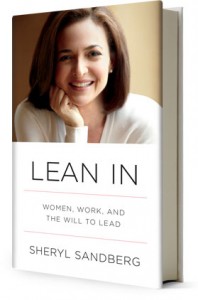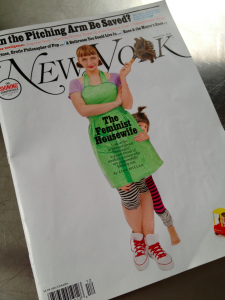 I have been reading with great fervor all of the articles coming out surrounding Sheryl Sandberg’s book Lean In: Women, Work and the Will to Lead, and still I am left unsatisfied. The challenge with being a feminist in an arguably post-feminist space is finding your own voice amidst the masses.
I have been reading with great fervor all of the articles coming out surrounding Sheryl Sandberg’s book Lean In: Women, Work and the Will to Lead, and still I am left unsatisfied. The challenge with being a feminist in an arguably post-feminist space is finding your own voice amidst the masses.
I remember being at McGill University and hearing a girl proclaiming, with great satisfaction, that she was not a feminist. I continue to hear this everywhere I go, and I shake my head in disbelief. I was raised by a feminist mother, and I am an educated, self-employed woman, how could I not be a feminist? That begs the question: what does it mean to be a feminist in 2013?
For some people, they can’t get around the word itself: FEMINIST. Perhaps to them it means a generation of radical, man-hating women, or perhaps they see it as a battle won. From where I am sitting, yes, feminism has taken us to a place of perceived equality, yet I still have friends who are terrified of the day when they will have to tell their boss they are pregnant. And only five years ago, I was sitting in post-oil Ghana talking with young, educated girls who felt their only opportunity for financial independence was prostitution. It is all relative.
The word itself has become somewhat loaded – the fact that many of us feel disconnected to the word ‘Feminism’ points to something larger. The story. What is the story around feminism today? Even Sheryl Sandberg refers to it as “the F word” in her recent interview Now is Our Time.
 In reading books like Lean In, and articles like The Feminist Housewife, I Leaned In, or Why I’d Rather Stand Up Straight Than Lean In, I am left more confused than when I started. The only solace I find is that my story, that of Megan Sheldon, solopreneur and storyteller, is being written from a place of power, passion and purpose. But that wasn’t always the case.
In reading books like Lean In, and articles like The Feminist Housewife, I Leaned In, or Why I’d Rather Stand Up Straight Than Lean In, I am left more confused than when I started. The only solace I find is that my story, that of Megan Sheldon, solopreneur and storyteller, is being written from a place of power, passion and purpose. But that wasn’t always the case.
In my previous careers, I found that leaning in just wasn’t cutting it. I grew tired of having to constantly battle and push in a corporate world that was designed by and for men. I knew that if I wanted to lead a balanced life that still afforded me a prosperous career, time with my family, and the ability to go for a walk mid-day if the sun comes out (in Vancouver you need to take advantage as soon as it does!), I would need to leave the patriarchal, hiearchal system and venture into new territory. Enter the entrepreneur.
Rather than leaning into the existing system, fighting for a position that may come with 3 weeks vacation and 3 months of maternity leave (we are more fortunate in Canada, but still our system treats women differently than men), why not break away? Imagine a world where the top execs, both men and women, suddenly said “No, this isn’t working for us.” Would they be ushered out quietly? Or would the system finally feel the urgency and realize that change is needed.
The premise for Sheryl Sandberg’s book Lean In can be seen in her TedTalk, where her question is “How do we change this”? Meaning, how do we keep women in the workforce who appear to be dropping out or leaning back in favour of family and lifestyle. Her points are valid:
- Get women to sit at the table – we tend to underestimate our own abilities
- Make your partner a real partner – this will make it easier for both genders to work in the home
- Don’t leave before you leave – keep your foot on the gas pedal until the very day you need to leave to take a break, and don’t make decisions too far in advance.
Yet, I am not convinced. Why not go that extra mile – now that we have the eyes and ears of many young and savvy business women, and people around the world chiming in? Why not encourage us to rally together and CHANGE the system? Why lean in to something that will inherently disappoint us?
My partner is from Sweden and while they deal with their own challenges as a nation, I love how they encourage and value both the man’s and the woman’s role in raising a family. His friends back home with kids talk about the year and a half they were given for Mat / Pat leave, and how if the ‘minority parent’ (typically, but not always the man) does not take his allotted 2 months, it disappears. Most of them have worked it out so the mother stays at home for the first 6 months and the father stays at home for the following 6 months. They then ‘bank’ the remaining 6 months to take when their children are older, favouring a travel experience or sabbatical to spend additional time with their family abroad.
There is no easy answer, especially not in a system like ours, where we feel like the cement has all but set on the way things ‘are‘. Change is hard. Yet, hasn’t it always been hard? Imagine the battles women fought, and won, 60 years ago. Change IS hard – that is what makes it worth it.
